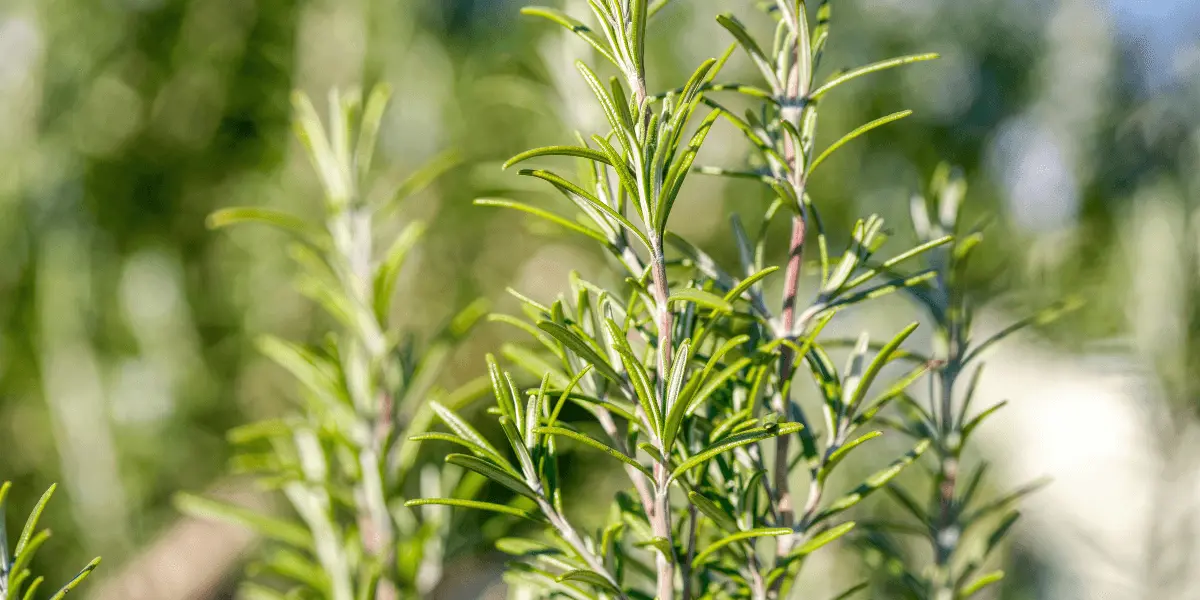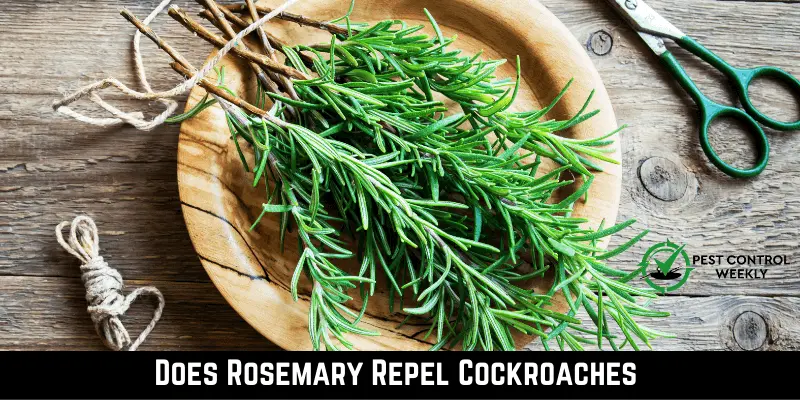Cockroaches are highly nuisance creatures, and once inside your home, it could be hard to remove them. Along with rosemary, there are many natural herbs to repel cockroaches. Now the question in your mind would be; does rosemary repel cockroaches?
Yes, rosemary is effective in repelling cockroaches because of its powerful scent that roaches hate. You can use the rosemary plant or its essential oil to keep cockroaches away from your home and property. Moreover, it doesn’t require too much water to grow, making it unattractive to roaches.
Do you want to eliminate cockroaches without using insecticides or other harmful chemicals? If so, read the instructions below to learn how to use rosemary to keep away cockroaches efficiently.
How Does Rosemary Keep Cockroaches Away?
Rosemary is an everlasting plant of North America. In addition to giving your food a taste, rosemary is the best cockroach repellent. It has grayish-green leaves and blue flowers. Cockroaches are used to avoid it due to its pine-like smell. Additionally, rosemary has significant ingredients that make it a potent oil that aids in keeping cockroaches away from the rosemary region.

As cockroaches have a strong sense of smell, the rosemary scent makes them run away from the concerned area. You can use it either in the form of a plant or oil. However, it doesn’t work well in winter. If you plant it in a container, you may move it indoors when the weather becomes chilly.
Will Rosemary Get Rid of Cockroaches?
Yes, rosemary is one of the effective herbs in getting rid of cockroaches. Even a minute concentration (2.5%) of rosemary oil can help you keep cockroaches away from your home. According to the Journal of Arthropod-Borne Diseases, rosemary oil is very toxic and has a 100% mortality rate for cockroaches, especially brown-banded roaches.
If you use rosemary essential oil to deter rats and replace it frequently with a new one, cockroaches will not cope with its potency and will die eventually. Adding rosemary oil to a DIY cockroach trap or using it as part of the sterilization procedure are two options for repelling roaches.
Additionally, a high concentration of rosemary oil will keep cockroaches away for up to 4 hours. Thus, it would be the best choice for roaches prevention.
How Do You Use Rosemary to Repel Cockroaches?
Although rosemary is the favorite herb for cooks, you can use it in the best possible way to throw away roaches from your kitchen, attics, and toilets. You can plant rosemary both outside and inside your building. To grow outside, choose your yard, while you may plant rosemary in a vase for indoor areas.
The most effective way to use rosemary oil is to dilute it by adding a small amount into a water bottle, then sprinkle it in suspected areas of cockroach infestation. Below are some steps for making rosemary cockroach deterrent:
- Firstly, add some tap water in a spray or water bottle.
- To dilute the rosemary oil, add 15-19 drops into the water, then mix it well.
- Now, sprinkle this mixture in areas such as door knobs, windows, and doors to prevent the entry of cockroaches into your home.
- Furthermore, you can soak cotton balls directly in rosemary oil and place them in suspected areas of cockroach attack.
What Herb Kills Cockroaches Other Than Rosemary?
Even though rosemary is one of the best cockroach repellents, you can also use the below herbs to repel and kill cockroaches:
Bay Leaves
According to the book Vegetable Crop Science, bay leaves is among the most common crops in the United state of America, and it is one of the great options for repelling cockroaches. It consists of a eucalyptol, making it a powerful cockroach-repellent.
Bay leaves grow on a tree of height 40-50 feet. However, you can sow this plant in a vase to keep them inside your home. These leaves need a lot of sunlight for their growth, so put them in areas of good sun exposure. You can place some dried bay leaves in the kitchen cupboards and at the home’s entrance to deter cockroaches from entering your house and eating in your kitchen.
Mint
While mint plant odor freshens up your room, you can use this scent to repel these pesky critters from your home or yard. Cockroaches hate the powerful smell of mint and will not come to areas near mint plants or oil. It is best at making DIY cockroach repellent.
You can make a DIY solution by adding a few drops of mint and peppermint oil in a half cup of water to keep away roaches from your region. In addition to cockroaches, mint plant or oil is highly effective in deterring bugs, beetles, and fleas.
Osage Orange
Osage orange is a small tree and a massive shrub that grows between 8 and 15 meters in height. It produces some fairly odd-looking huge fruits, and compounds in these fruits ward off pests.
The smell of osage orange is highly repellent for cockroaches. All you need to do is just plant these trees in your garden or sprinkle their dried leaves in the entry points of your home to keep roaches away.
Catnip
Catnip is another potent herb to deter cockroaches and insects like fleas, beetles, and bugs from your home. It contains an element, nepetalactone which is highly effective in keeping roaches away. Catnip can grow in a low amount of water and sunlight so, you can breed this plant inside your home to throw away cockroaches.
However, if you have a pet cat in your home, catnip is not a good choice because it is highly toxic for your cat. If you are willing to use the plant, you can use its essential oil to deter cockroaches by simply making its dilute solution.
Chrysanthemums
Chrysanthemum is well-known for its colorful flowers ranging from white to burgundy and purple to yellow. They serve as a cockroach deterrent besides providing your property with an attractive appearance.
It contains pyrethrins that are a natural pest deterrent and are best at kicking off cockroaches. Moreover, this chemical is used in making insecticidal spray. To keep cockroaches away, you can plant chrysanthemum plants in your home and garden. However, beware of its toxicity for your pets while using.
Lemongrass
Lemongrass is a type of grass used for decorative purposes in your home or garden. However, you can plant it in your yard to get its essential oil to deter cockroaches. Lemon grass oil is highly beneficial for keeping cockroaches away from your property, especially german cockroaches.
The small concentration of lemongrass oil repels cockroaches, while a large amount can kill them. If you want to keep roaches out of your house, plant lemongrass along the base of your property. Alternately, mist window sills, entryways, and hiding places with a combination of lemongrass essential oil and soapy water.
Marigold
Marigold is a constant partner of vegetable gardeners and best against the battle with cockroaches. It has yellow and orange flowers and contains the chemical alpha-Terthienyl, making it a strong cockroach deterrent.
To throw away cockroaches from your home or property, simply plant marigold flowers outside and inside your home. You should try these beautiful flowers to ward off roaches even though their efficacy is still debatable.
What Insects Does Rosemary Repel?
Aside from repelling cockroaches from your home or yard, rosemary is also effective in repelling the below-listed insects:
Flies
Flies are one of the most abundant household insects. They create a nuisance and also spread deadly diseases by contaminating your food. Getting rid of flies is a burdensome task, but you can use natural repellents like rosemary oil to repel them. As rosemary oil has a strong smell, flies suddenly ward off as you sprinkle it along the entry points of your home.
Mosquitoes
Mosquitoes are one of the most irritating and deadly pests as they carry vectors of diseases like malaria and dengue fever to human beings. They love to move outside their nests in mid-season to get their food.
Removing mosquitoes permanently from your home is always a challenging task, however, you can make a diluted spray of rosemary oil to throw them off. To prevent mosquitoes, you just need to sprinkle this spray along the entry points of your home, like windows and doors.
Cabbage Moths
Cabbage moths are one of the most common insects in gardens. They are irritating pests and cause massive damage to plants. To prevent your plants from these deadly pests, you can use either rosemary plants or their oil.
You can spray diluted rosemary oil directly on plants to deter cabbage moths. Additionally, cabbage moths hate the smell of rosemary, so growing rosemary plants in your garden will protect your crops.
Beetles
Beetles are one of the most common insects of plants, but they also come inside your home to survive the worst weather conditions. If beetles attack your plants or find their way into your home, use rosemary to repel them. You can grow rosemary plants in pots and place them near your windows and doors to prevent the entry of beetles into your house.
Moreover, to protect your plants from beetles, plant rosemary herb in your garden or sprinkle its diluted essential oil on them.
Final Verdict
Cockroaches are annoying pests, and nobody enjoys discovering them in their home. Although there are insecticides available in the market to kill or repel cockroaches, they are expensive, and cockroaches develop resistance against them.
If you are tired of wasting money and time on such deterrents, use natural herbs like rosemary and bay leaves to keep roaches away from your home. Furthermore, they are safe and easy to use against cockroaches.
Always remember that these herbs won’t be effective in preventing cockroaches if you already have a problem with them. You must contact a professional pest control company for a better solution to the roaches issue.
References
Sharififard M, Safdari F, Siahpoush A, Kassiri H. Evaluation of Some Plant Essential Oils against the Brown-Banded Cockroach, Supella longipalpa (Blattaria: Ectobiidae): A Mechanical Vector of Human Pathogens. J Arthropod Borne Dis. 2016 Oct 4;10(4):528-537. PMID: 28032105; PMCID: PMC5186743.
Tripathy P. Bay Leaf. In: Handbook of Herbs and Spices. Peter KV, editor. Boca Raton (FL): CRC Press; 2012. p. 597-605.

